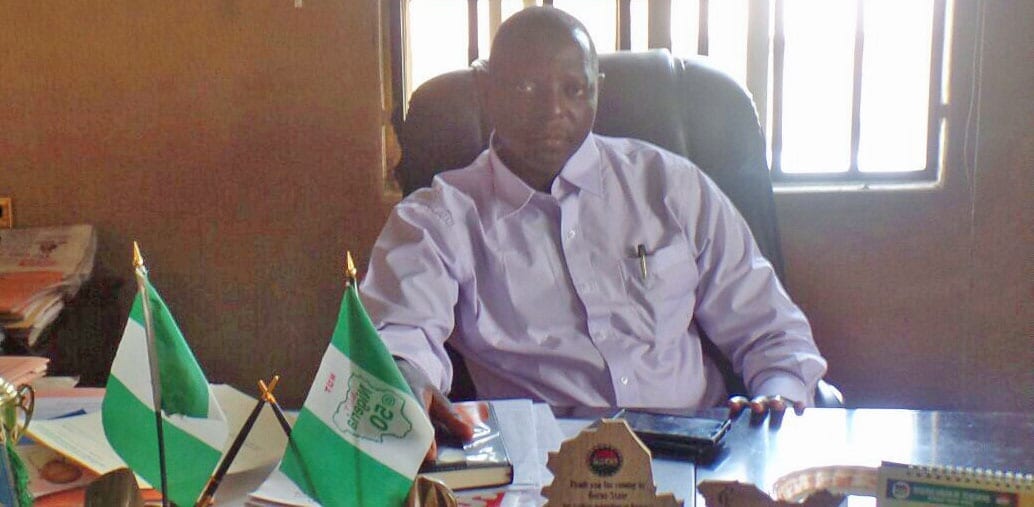
Feb 18, 2016
In northeastern Nigeria, where violence has terrorized communities over the past several years, the Nigerian Union of Teachers is going beyond the difficult task of ensuring students continue to receive an education and teachers get the support they need. Union leaders and members have taken on the enormous job of providing housing, food and medical assistance to some of the thousands of teachers and their families displaced by the upheaval.
In Borno state, where the teachers’ union includes members from 2,000 schools, the union converted nearly all of its conference space into housing for those displaced by the violence. The union has provided food, clothing and shelter to some 200 union members and their families in the past year. It also has created a database of Borno-based union members killed in the insurgency. The union has tallied 388 teachers killed in Borno as of January, the majority of the more than 600 Nigerian teachers killed by suspected Boko Haram in the northeast.
“Teachers are traumatized and hence hold lessons in fear,” says Bulama Abiso, chairman of the Borno state branch of the Nigerian Union of Teachers and a former teacher and principal. “They fear suicide bombers’ infiltration of the school.” Over the past six years, Boko Haram has targeted public and private schools in northeast Nigeria, dousing the facilities with gasoline at night and setting them ablaze. Militants have also hurl homemade bombs at the concrete classrooms.
Across the country, some 19,000 teachers have been displaced, Michael Alogba-Olukoya, told the International Business Times. Alogba-Olukoya is president of the Nigeria Union of Teachers, a Solidarity Center ally.
Despite the incredible personal risk, teachers continue to their jobs in the classroom. To encourage students to return to school, Suleiman Maina, the state representative of the National Union of Teachers in Borno state, says the union is partnering with the government and other stakeholders to keep as many schools as possible open in and around the state capital.
“Our state governor has formed a high-powered committee” which includes representatives of the Nigeria Union of Teachers, principals and other stakeholders,” he says. “Out of about 1,000 primary schools, now 400 in Maiduguri and outskirts are running. It is so encouraging because now in schools, teachers are performing their jobs,” he says.
Adamu Wakawa, principal of Government Girls College in Maiduguri, the Borno state capital, leads a school that also serves as a camp for internally-displaced people. “Managing students and displaced persons is the greatest challenge that we are now facing,” he told the Nigeria Union of Teachers. “As far as I’m concerned, together with the government, effort is being made to see that students do not lose.”
In addition to raising awareness about political violence as a workplace health and safety issue for front-line workers, Abiso, who also serves as vice chairman of the Nigeria Labor Congress for Borno State Council, says the union has opened a door to conversations linking civil society with government, and is a member of key committees considering policy on resettlement of those displaced. Union leaders also are planning for opportunities for youth when the conflict ends.
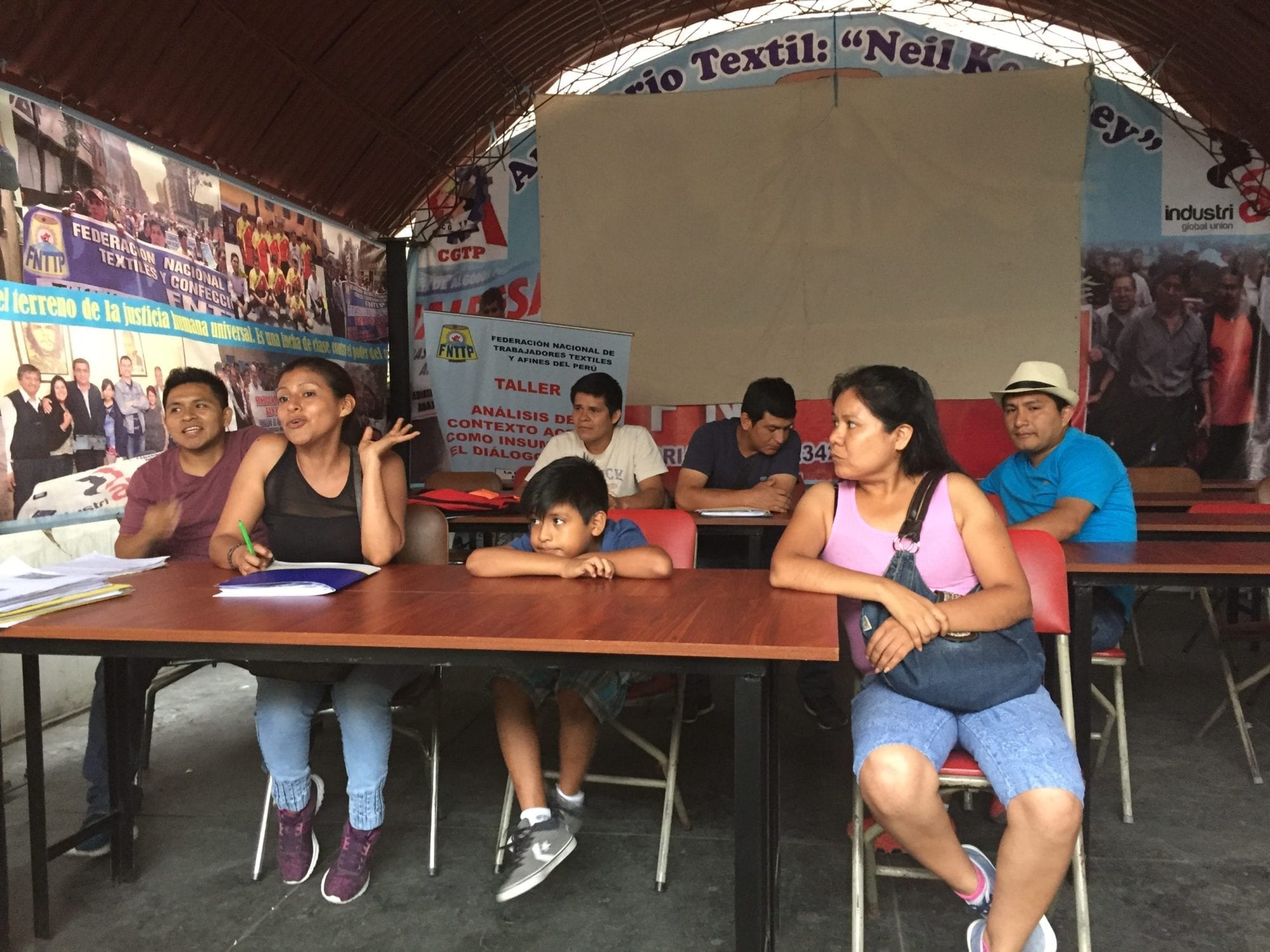
Feb 16, 2016
Peru’s National Federation of Textile Workers is calling for immediate reinstatement of 11 textile workers who were fired less than a month after they formed a factory union in Lima. The factory, which employs more than 1,400 workers, produces high-fashion jeans for the Peruvian market.
The garment workers, many of whom had worked at the plant between nine and 20 years, created a factory union in January to improve their workplace conditions. Although most textile workers in Peru are employed on short-term contracts, the workers who lost their jobs have more stable employment because they are on indefinite contracts—yet they still risked their employment to improve working conditions. (See a video of workers protesting the company’s actions.)
After the garment workers formed the union, they say managers called union leaders into one-on-one captive audience meetings and presented each worker with a set of threats and incentives to abandon the union.
Helen Vallejos Reyes, a garment finishing worker with 20 years experience, said a manager told her to “accept the money we are offering you or we’ll see you in court.” She says managers kept her and other union members in isolation for more than five hours at the factory. Despite these pressures, Reyes says, “we all decided to not take their offer.” When the workers refused to leave the factory after the one-on-one meetings, which concluded before their shift ended, managers fired them, saying they illegally occupied the factory.
Lorena Chavera, a union organizer who has accompanied the garment workers as they sought to form a union, is hopeful about the outcome. “We spoke a lot before the workers decided to join the union,” she says. “They knew the risks they faced and they chose to go forward. I know what it feels like to lose your job for standing up, but I am confident that we will see justice for these workers because it is their constitutional right to organize and call for fair treatment.”
The National Federation of Textile Workers is working with the union to document the anti-union campaign, taking the case to government labor inspectors and the Ministry of Labor, and seeking recourse through the legal system.
Textile workers in Peru increasingly are mobilizing for their rights at work, and this new union has affiliated 22 new workers over the last couple of weeks despite employer opposition. Workers have formed two unions at factories since January, both affiliated with the National Federation of Textile Workers. (The Textile Workers union educates workers about their rights through information pamphlets and in one-on-one discussions.)
Peru has ratified International Labor Organization (ILO) conventions on the freedom to form unions and collectively bargain.
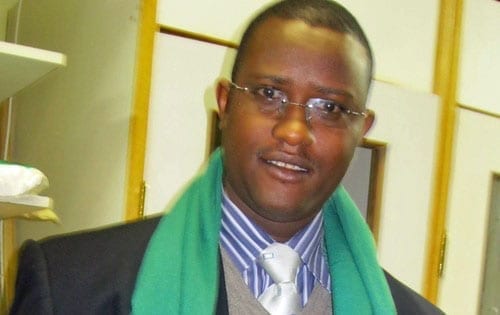
Feb 1, 2016
Alexandre Niyungeko did not flee Burundi last April when a source told him the police were planning to kill a few journalists and civil society leaders—as a warning to protesters and critics of the government—and his name was on the list.
And when anonymous callers told him his days were numbered, Niyungeko, president of the Burundi Union of Journalists (BUJ), persisted in Bujumbura, the capital, though he did go into hiding. “It wasn’t the first time someone had tried to intimidate me,” he says, explaining that, as head of the union representing 400 journalists, he often raised complaints about infringements on freedom of the press.
The threats escalated in the days after police shuttered independent radio stations and surrounded the Press House, where union and independent journalist organizations—among them the Burundian broadcasters, women journalists and a media monitoring organization—had offices, and summarily shut it down. “It’s the first time in the history of Burundi that the press was closed by police without explanation,” he says, adding that when he asked authorities who had amassed outside the building to see the order for closure, he was told: “If you continue to ask questions, you’ll be in trouble.”
Not long after, his neighbors warned him that strangers were asking about him and his routine at home.
“I was being hunted,” he says. “And that day I realized my family could be hunted, too.”
Indeed, his worst fears became reality when someone threw a grenade into his apartment when his wife and children, ages 3, 6 and 8, were home. Fortunately no one was injured. But Niyungeko knew that the only way to protect them all was to leave. In May 2015, he waited until his family had safely entered the airport transit area with tickets to fly out of Bujumbura before he set off on a separate journey. He made the dangerous overland trip, avoiding half a dozen checkpoints along the way, and met them in Rwanda.
More than 230,000 Burundians have fled their country to escape the violent crackdown that has raged since last April, when people took to the streets to protest President Pierre Nkurunziza’s announcement that he would run for a third term. Some 72,000 refugees—among them hundreds of union leaders and their members, including at least 250 teachers—have sought shelter in neighboring Rwanda.
The government’s efforts to intimidate and control the press has forced at least 100 journalists into exile, the Committee to Protect Journalists reports, and many others have been arrested and jailed, says Niyungeko. In addition, two Western journalists were arrested and briefly held last week.
Niyungeko says it is difficult for the journalists’ union to continue activities, with many leaders and members in exile, though they managed to organize a workshop for 30 Journalists in Kigali, 20 exiled and 10 from Bujumbura. Meanwhile, they continue to monitor the situation at home.
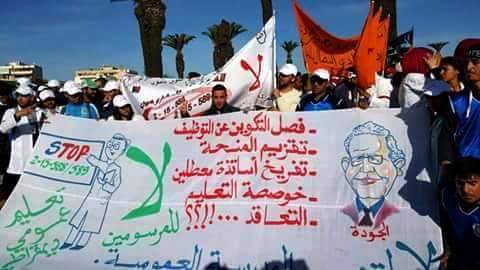
Jan 27, 2016
Thousands of teacher trainees, holding banners reading “Marching for dignity and justice,” and chanting “We’re prepared to go to prison,” marched through the streets of Morocco’s capital, Rabat, this week to denounce two government decrees to cut scholarships and jobs.
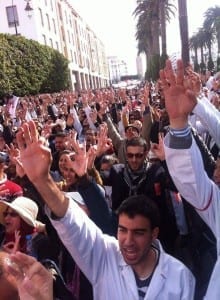
Teacher trainees defied government threats barring them from public protest. Credit: Hicham Ahmadouch/UMT
The protest followed a meeting between representatives of the teacher trainees and the government, which refused to annul the two decrees but agreed to recruit an additional 3,000 teacher trainers not covered by the 2016 fiscal year budget.
The workers, who have been on strike for two months, took to the streets despite government threats against unauthorized marches. At a rally earlier this month, several teacher trainees were beaten by police. Primarily in the their 20s and 30s, teacher trainees say the government’s decrees will further fuel the country’s already high youth unemployment rate, which, at more than 20 percent, is double the nation’s overall unemployment rate.
Morocco’s head of government, Abdelilah Benkirane, asserted that he will not “repeal the government decrees,” regarding teacher trainees.
Earlier this month, some 4,000 workers staged a sit-in outside the parliament in Rabat to protest worker cutbacks in pensions and ongoing worker rights violations, including the attacks on the teacher trainees.

Jan 26, 2016
The president of the Malaysian Trades Union Congress (
MTUC), Mohd Khalid Atan, passed away this morning, reports MTUC Secretary-General N Gopal Kishnam. The MTUC is a Solidarity Center ally.
“MTUC is deeply saddened by the loss of the most credible individual who gives priority to the interests and welfare of workers,” said Gopal in a statement today.
Khalid, 63, was first appointed by the Congress as its president in 2011 and was reappointed in 2013, according to Astro Awani, a Malaysian news outlet.
MTUC is at the forefront of protecting worker rights, including documenting the exploitation of hundreds of migrant workers in Malaysia.






